Academy for Legislation
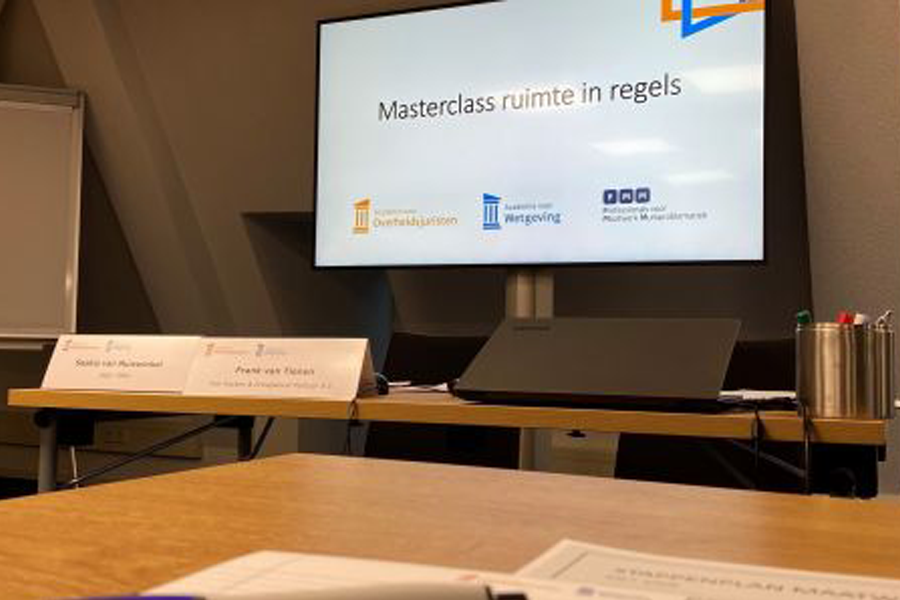
Ever seen a code of laws up close? It’s a thing to behold. The online version of the first book of the Dutch Civil Code alone already has a word count of over 79.000 words, spread across 20 chapters and 462 articles. And all that text also contains very specific legalese. Intense.
Government and legislative lawyers obviously need to stay on top of all these laws. They also need to be able to interpret and contextualise them, in order to provide sound advice. Being able to do so requires more than just a law degree. At law school, the fun’s just getting started.
Even after graduation, lawyers need to keep honing their skills and expertise. To do so, government and legislative lawyers follow training programmes like the ones hosted by the Academy for Legislation.
In today’s Training Improvement Story, we show you how the Academy for Legislation took a pre-existing masterclass and turned it into a successful, meaningful blended training programme. This allowed them to offer learners a proper learning experience, both online and offline.
A quick glance
Looking for a sneak peek? Here's a list what you'll read about in this training improvement story:
- Challenge 1: There is a high demand for courses, but experts have little time to train in their already busy schedules.
- Challenge 2: Making blended classroom masterclasses is the solution, but there is a lack of expertise to do so.
- Solution: In collaboration with SMEs, Training Improvement Engineer Puck created strong learning content and helped turn the course into a blended format via aNewSpring.
- Result: 70% of the learners activated their online learning environment three days before the course started and they rated the e-learning with an 8,2.
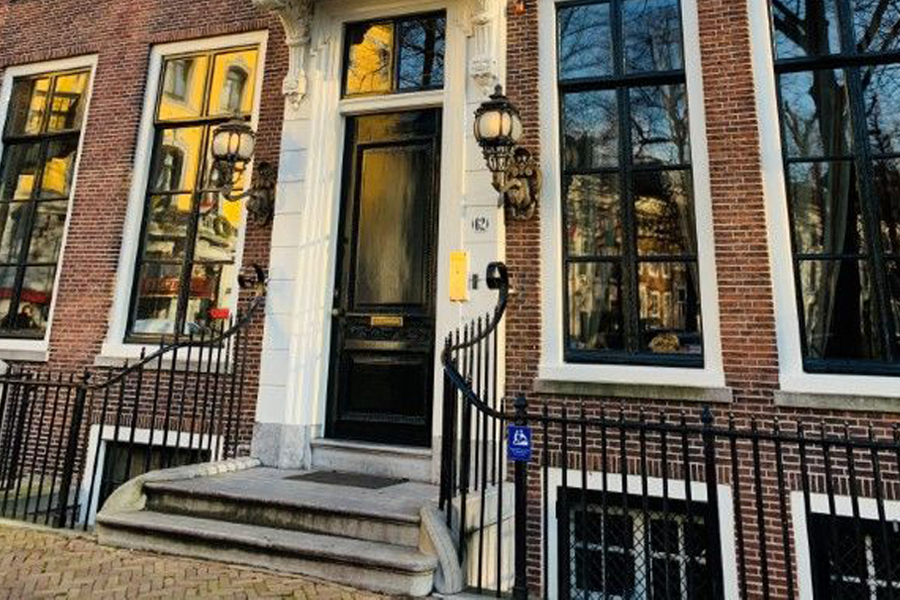
About Academy for Legislation
The top training institute for legislative lawyers
The Academy for Legislation focuses on building training programmes that help legislative lawyers stay up to date with contemporary legal knowledge. Together with the Academy for Government Lawyers, they are the Dutch national government’s number one training facility for legal experts.
Legislative and government lawyers have a wide range of responsibilities. Consider things like giving legal advice, handling objection and appeal cases, drawing up contracts, but also writing and implementing laws and regulations. To do these things well, they need to be aware of all the latest legal developments.

Huge demand for training skills of Dutch government experts
We spoke to Hanneke Bezemer and Renske Kersbergen, Training Coordinators at the Academy for Legislation, about their current challenges, what’s currently going on at the Academy and how all of this led to a renewed collaboration with aNewSpring.
This collaboration took the shape of turning an existing masterclass into a blended learning journey. This masterclass, ‘Ruimte in Regels’ (“Relaxing/Stretching the Rules”) is an initiative and instrument of the governmental organisation Professionals for Customisation in Multi-Problem Cases (PMM). We’ll get back to this in a bit, it’s a nice story. Promise!
First of all, it’s important to note that the Academy for Legislation has access to a wealth of knowledge and expertise, in-house as well as externally.
Despite the enormous amount of expertise at the Academy’s disposal, subject matter experts – who often contribute to these training programmes outside their regular jobs – face considerable time restraints.
“Not all teachers have time to teach outside of their working hours more than once or twice a year.”
Hanneke Bezemer: “We’re experiencing huge demand from ministries and implementing agencies to develop these training programmes. Sometimes, getting access to the right training providers proves to be tricky. Not all of these subject matter experts are able to teach more than once or twice a year, as giving training is added to their regular workload.”
It seems that, in order to meet the high demand for legal training programmes, other, more scalable training methods are required.

Offering relevant expertise at scale
For the most part, the Academy of Legislation’s training programmes take place in the classroom. But training in person puts pressure on the schedules of the people teaching the courses.
Renske Kersbergen: “We experimented with an online training facilitated by aNewSpring around ten years ago for the first time. Back then, we ran the course quite a few times, but eventually stopped using it.”
Some five years ago, the Academy decided they wanted to pick up blended learning once more. This learning type consists of different forms of learning, which learners can experience both online and offline.
When the pandemic forced people to become more accustomed to interacting online, their plan gained momentum. The next challenge: getting all the involved stakeholders aligned on how to proceed.

Collaboration between multiple stakeholders and experts
In order to successfully launch this completely new blended learning project, it was crucial to make sure several stakeholders were on the same page.
Apart from training coordinators Hanneke and Renske, initially, subject matter expert Frank van Tienen, lawyer at Pels Rijcken, was also closely involved with the project.
As for SMEs that would eventually be teaching the courses? That would be Karolien Runia, lawyer, labour expert and customisation coordinator at the UWV, and Saskia van Muiswinkel, director of the National Portal for Customisation and Multi-Problems at PMM.
Add Puck Onnekes, Training Improvement Engineer at aNewSpring, and we were looking at a true all-star team to make this blended learning dream come true.
The plan? Turning the pre-existing, successful masterclass ‘Ruimte in Regels’ into an enriched learning experience, with both online and offline elements. This masterclass is one of many instruments PMM offers in their professional development pillar. The reason for adding e-learning to the course was that they would now be able to reach a wider audience.

Turning an existing masterclass into successful e-learning
The masterclass ‘Ruimte in Regels’ was developed for lawyers and policymakers at municipalities and in the national government (policy and executive organisations), whose day-to-day jobs involve delivering customised solutions.
In order to help households dealing with multiple problems (‘multi-problem households’), it’s often necessary to come up with custom solutions. Legislative and regulatory bodies try to facilitate these types of customised solutions to the best of their abilities.
But in some situations, the rules don’t provide enough wiggle room, or the combination of several rules only makes problems worse. It may also happen that, although the space for customisation is there, it’s not used optimally. That’s about it for a quick contextualisation of this (rather complex) legal topic.
The main challenge when redoing the masterclass was: how do we turn an in-person learning journey into one that partially takes place online, in the most thorough way possible? And how do we make sure this online experience improves the in-person part of the training?

The decision to work with aNewSpring
Because the Academy for Legislation’s team had already worked on an online training with aNewSpring before, the organisation was once again included in the procurement process.
Hanneke Bezemer: “We were actually in touch with several parties. But we had access to and were familiar with the aNewSpring learning journey platform already, which we found to be very user-friendly.”
The final deciding factor? “There was a financial component, but we also very much appreciated the open, pleasant communication we had with aNewSpring from the start. Besides, the extra service provided by Training Improvement Engineer, Puck, played a large part in our decision.”
Turning the ‘Ruimte in Regels’ masterclass into blended learning didn’t happen in a day. In order to create the very subject-specific e-learning, Puck needed to align with the Academy of Legislation’s subject matter experts.
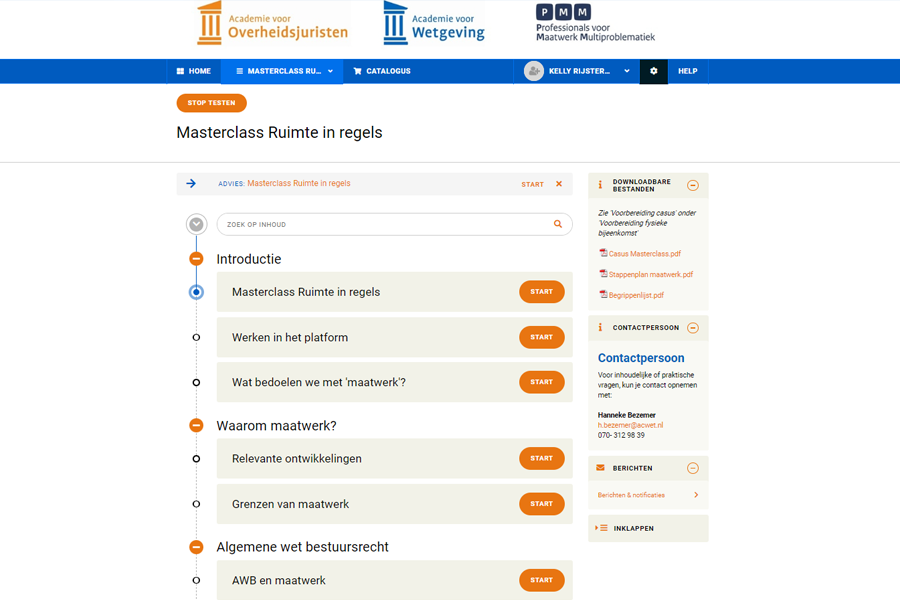
Creating the right learning content, together
Initially, a bit of searching was necessary to discover the optimal collaboration among Puck, the training coordinators at the Academy, and subject matter experts Saskia and Karolien.
What was everyone expected to do, specifically? What’s the best division of roles? How do we ensure the subject matter experts’ unique knowledge is best applied in the online experience of the e-learning?
One of the stakeholders involved is Karolien Runia, customisation coordinator at the UWV, an organisation that has to deal with a lot of legal customisation. Karolien had prior experience at the UWV with a well-designed e-learning, which also included a complimentary workshop.
For her, an online learning journey like this was nothing new. Karolien: “I already had a positive attitude towards using e-learning. It’s efficient and it saves trainers like me time commuting. Besides that, it allows you to reach more learners and speeds up the learning process.”
Karolien was very appreciative of the collaboration with Puck. “The whole process was organised efficiently. We had some back and forths on the content itself. But I really enjoyed the collaboration. It was directed properly.”
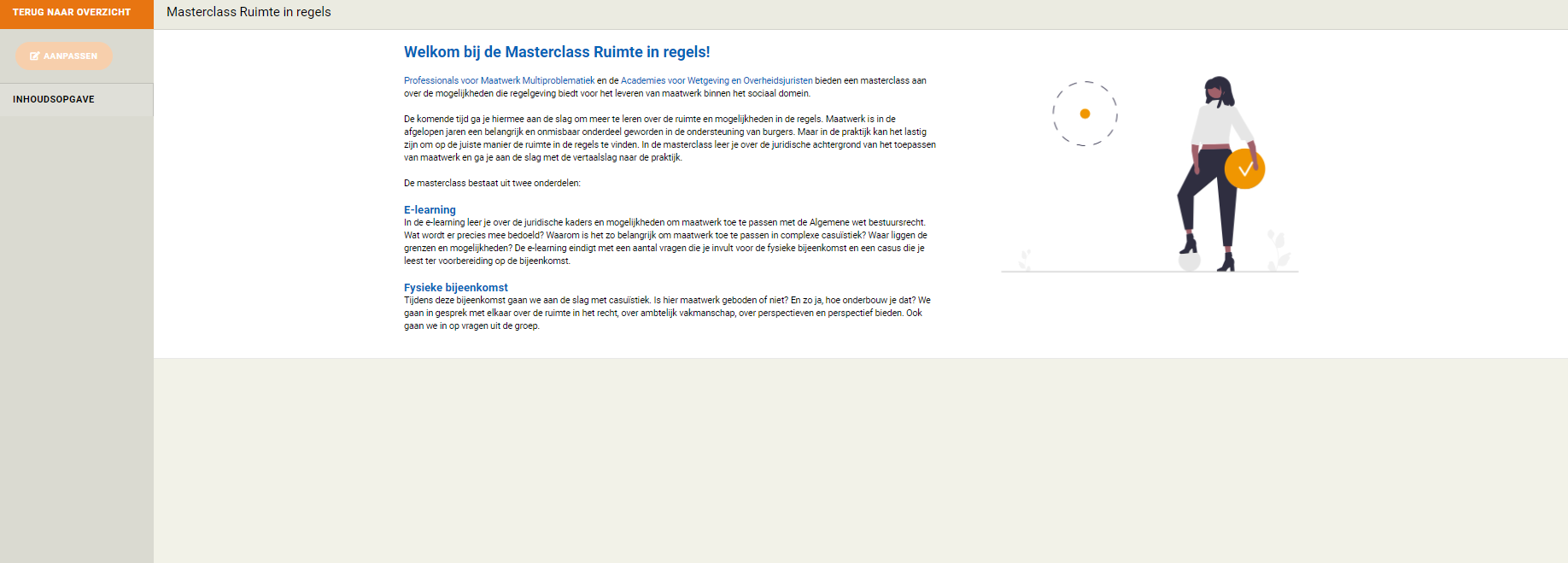
Aside from Karolien, Saskia van Muiswinkel, the other subject matter expert and trainer for the ‘Ruimte in Regels’ masterclass, also mentioned she thoroughly enjoyed the collaboration.
Saskia is the director of the National Portal for Customisation and Multi-Problems at PMM. This organisation offers an entrypoint at the Dutch national government for professionals that get stuck on complex case work. The ‘Ruimte in Regels’ masterclass is one of the PMM’s instruments.
While Saskia was new to using blended learning, she’s convinced of its benefits: “It’s efficient, especially in case of a training like this that depends on a heavy theoretical framework. And with a mixed group of learners like those attending the Academy of Legislation’s courses, it helps when people can learn at their own pace.”
This mixed group of learners partially consists of lawyers that could work through the learning content quite quickly. At the same time, this group could also use the course to get an enriched learning experience through video content and extensive reports on things like the parliamentary inquiry into Fraud Policy and Services.
“But learners who aren’t as familiar with the course content can now absorb it at their own pace,” Saskia explains. “I find that a very positive characteristic of the blended learning approach.”
She also warns that customisation, the masterclass’s topic, is a field that’s rapidly developing. Meaning it’s essential to try to keep the e-learning up-to-date as much as possible, and to keep an eye out for any changes in legislation.
“Learners who aren’t as familiar with course content can absorb it at their own pace. This is a positive aspect of the blended learning approach.”
As subject matter experts, Karolien and Saskia mainly contributed in areas that e-learning participants encounter in practice. Especially when it comes to legal matters, practical guidance and real-world examples are very helpful. Sometimes even crucial.
Saskia: “When you’re dealing with heavy theory, article number such and such of the Dutch General Administrative Law Act, I personally feel like I need to hear: who are we talking about, exactly? Give me a concrete example. Which is why Karolien and I included both case studies and examples from jurisdiction when we were building the e-learning.”
Ultimately, Puck Onnekes was responsible for building the content for the online learning journey. Quite the challenge, since, prior to the collaboration, she hadn’t really come into contact with the topic of custom solutions in administrative law before.
Puck: “I had documents and slides at my disposal that had previously been used during the masterclass, but not much of it could be included directly. This meant I really needed to rely on the knowledge of the experts. It was an amazing challenge, which led to quite a few in-depth discussions.”
According to Puck, the results don’t lie. “You clearly notice how the e-learning contributes to the in-person part of the masterclass. That was the goal we wanted to achieve together.”
Apart from the collaboration between training coordinators, trainers/subject matter experts and the Training Improvement Engineer, the success of a learning journey wholly depends on the way it’s received by learners. How did these learners experience the new, blended format for the ‘Ruimte in Regels’ masterclass?

A more effective masterclass with happy learners
First, let’s give you some more context on the ‘blended’ aspect of the new masterclass. One of the additions of blended learning was through aNewSpring’s survey feature.
This feature made it possible to ask learners preliminary questions like: “What is your opinion on custom solutions in administrative law?” They were also presented with a specific example and asked whether they would opt for a custom solution in this case.
Previously, these questions were part of a digital intake process, already. The format of this intake was amended using aNewSpring’s survey feature.
Hanneke Bezemer: “We combined the original intake with the survey feature, giving us centralised access to the answers. This gives everyone involved an easier overview of the results. You can simply download all the answers as an export, which means you get insight into the results at the click of a button. It’s amazing.”
The Academy for Legislation exports these results, which are very easy to extract from aNewSpring’s learning journey platform. This gives trainers Karolien and Saskia a good overview of their learners’ answers. Karolien: “Apart from that, it’s convenient to be able to see at what percentage learners have completed their e-learning.”
Saskia: “It can be complicated to give direction to the groups we train, because of big differences in the basic knowledge individual learners possess. Which is why it’s so important to know who completed the e-learning, before the masterclass kicks off.”
Importance of the data
She also mentions how it’s important to get a good grasp of learners’ attitudes to the specific topic of custom solutions in administrative law, and how often they encounter this in their day-to-day jobs. This facilitates a group conversation on the topic of custom solutions, right from the start of the course.
Data shows that at least 70% of the learners activated their online learning environment three days before the course starts. And there were also two moments in which learners were asked to evaluate the course. These showed they considered the e-learning to be a valuable addition, with an average grade of 8,2.
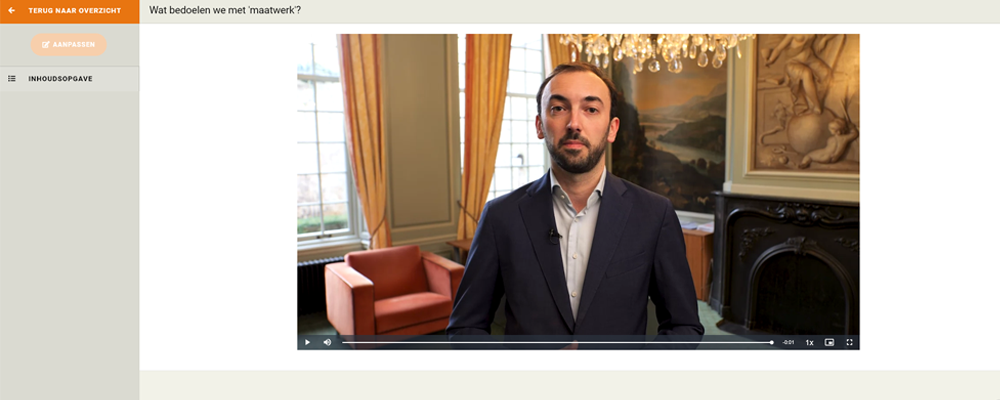
Saskia: “The in-person part of the course is quite brief. With the survey feature, we could get a clear picture of who would be attending the course. Not just their names and job titles, but also what their perception of custom solutions in administrative law were. We can use that information to get group conversations going during the in-person part of the course.”
It turns out the online part of the learning journey was a huge enrichment of the in-person part of the masterclass. Apart from the added efficiency created by merging the intake and the original survey questions, the masterclass itself also became more effective due to the use of blended learning.

Futureproofing traineeships, potentially by adding e-learning, too
So, what’s next? What does a future collaboration between aNewSpring and the Academy for Legislation look like? Are there any other blended learning projects planned?
Hanneke Bezemer: “First of all, this revisited masterclass is the first time we’re offering a long-term course that partly takes place online. We don’t have any concrete plans for similar projects at the moment.”
“Right now, we’re focusing on our traineeships. What will those look like in the future? How can we make sure they’re future-proof? We’re not sure whether e-learning will play a part in those, but we are having those discussions.”
Puck is also aware of these internal conversations. She knows what’s going on at the Academy, and is ready to assist and advise where needed in her role as Training Improvement Engineer. Especially when there are questions regarding what type of learning content is or isn’t suitable for an online approach, her expertise can be of great use.
As far as an iteration on the ‘Ruimte in Regels’ masterclass is concerned, Saskia van Muiswinkel has some ideas of her own: “The e-learning currently consists of quite a lot of reading material. I’d love to know whether it’s possible to make this even more interactive. I’m curious as to the possibilities. I’m sure they know all about what’s possible over at aNewSpring.”
